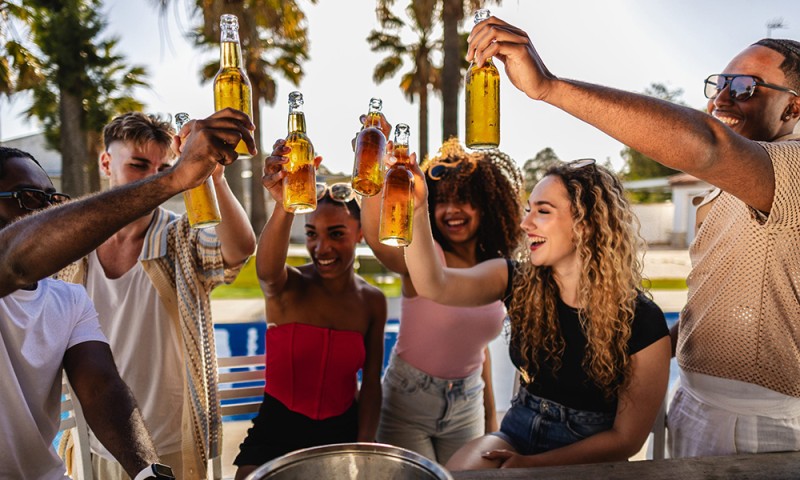
• Z世代的饮酒量较前几年有所增加,这表明酒类销量下滑并不能归咎于Z世代。据IWSR的一项研究显示,曾掀起“清醒好奇”运动的这一代人,如今比其他任何世代都更有可能表示自己“主动增加饮酒量”。该酒类数据和洞察机构发现,总体而言,73%的Z世代受访者在过去六个月内饮用过含酒精饮品,较2023年的66%有所上升。
Z世代饮酒量增多,这或许意味着他们的经济状况有所改善。
根据酒类数据和洞察机构IWSR对全球15个市场2.6万名受访者的调查,曾推动“酷”式清醒和“清醒好奇”运动的Z世代正在改变饮酒习惯。调查发现,总体而言,73%的Z世代受访者在过去六个月内饮用过含酒精饮品,而2023年这一比例为66%。
研究还发现,饮酒习惯的增长态势在美国尤为显著,70%的Z世代受访者表示在过去六个月内饮用过含酒精饮品,而2023年这一比例不到50%。尽管Z世代在饮酒选择上并无明显偏好,调查前六个月平均从五类含酒精饮品中挑选,但更倾向于选择烈酒。根据报告,Z世代在酒吧、夜店或餐厅饮酒的概率远高于全体成年饮酒者。
Z世代饮酒习惯的转变可能与其成员年龄增长和收入提升有关。该群体中年龄最大的成员如今已步入25至29岁的阶段。
尽管许多刚毕业的年轻人难以找到入门级工作,但美国银行(Bank of America)3月发布的一份报告预测,未来十年内,Z世代可能会成为最富有的世代,累计收入将达到36万亿美元。可支配收入的增加或许也意味着Z世代在饮酒方面的支出会随之增多。
报告显示,在被问及“你是否主动增加饮酒量”时,Z世代给出肯定回答的比例高于其他任何世代。
值得注意的是,如今这一世代的饮酒量与之前那些在二十多岁时饮酒量出现类似上升趋势的世代持平。
核心结论?IWSR消费者洞察首席运营官理查德·霍尔斯特德(Richard Halstead)表示,尽管各年龄段均呈现饮酒量减少的趋势,但酒类销量下滑并不能归咎于Z世代。
霍尔斯特德在一份声明中表示:“随着时间推移,步入职场的Z世代饮酒者数量日益增多,而已在职场打拼的往往收入更为可观。我认为,随着收入提升,他们的饮酒频率也会相应增加——就如同此前的千禧一代那般。”(*)
译者:中慧言-王芳
• Z世代的饮酒量较前几年有所增加,这表明酒类销量下滑并不能归咎于Z世代。据IWSR的一项研究显示,曾掀起“清醒好奇”运动的这一代人,如今比其他任何世代都更有可能表示自己“主动增加饮酒量”。该酒类数据和洞察机构发现,总体而言,73%的Z世代受访者在过去六个月内饮用过含酒精饮品,较2023年的66%有所上升。
Z世代饮酒量增多,这或许意味着他们的经济状况有所改善。
根据酒类数据和洞察机构IWSR对全球15个市场2.6万名受访者的调查,曾推动“酷”式清醒和“清醒好奇”运动的Z世代正在改变饮酒习惯。调查发现,总体而言,73%的Z世代受访者在过去六个月内饮用过含酒精饮品,而2023年这一比例为66%。
研究还发现,饮酒习惯的增长态势在美国尤为显著,70%的Z世代受访者表示在过去六个月内饮用过含酒精饮品,而2023年这一比例不到50%。尽管Z世代在饮酒选择上并无明显偏好,调查前六个月平均从五类含酒精饮品中挑选,但更倾向于选择烈酒。根据报告,Z世代在酒吧、夜店或餐厅饮酒的概率远高于全体成年饮酒者。
Z世代饮酒习惯的转变可能与其成员年龄增长和收入提升有关。该群体中年龄最大的成员如今已步入25至29岁的阶段。
尽管许多刚毕业的年轻人难以找到入门级工作,但美国银行(Bank of America)3月发布的一份报告预测,未来十年内,Z世代可能会成为最富有的世代,累计收入将达到36万亿美元。可支配收入的增加或许也意味着Z世代在饮酒方面的支出会随之增多。
报告显示,在被问及“你是否主动增加饮酒量”时,Z世代给出肯定回答的比例高于其他任何世代。
值得注意的是,如今这一世代的饮酒量与之前那些在二十多岁时饮酒量出现类似上升趋势的世代持平。
核心结论?IWSR消费者洞察首席运营官理查德·霍尔斯特德(Richard Halstead)表示,尽管各年龄段均呈现饮酒量减少的趋势,但酒类销量下滑并不能归咎于Z世代。
霍尔斯特德在一份声明中表示:“随着时间推移,步入职场的Z世代饮酒者数量日益增多,而已在职场打拼的往往收入更为可观。我认为,随着收入提升,他们的饮酒频率也会相应增加——就如同此前的千禧一代那般。”(*)
译者:中慧言-王芳
• Gen Z is drinking more alcohol than in years past, proving they are not to blame for a trend of declining alcohol sales. The generation that popularized the “sober curious” movement is now more likely than any other generation to say they are “actively choosing to drink more,” according to a study by IWSR. The drinks data and insights provider found that overall, 73% of Gen Zers surveyed had had an alcoholic drink in the previous six months, up from 66% in 2023.
Gen Z is drinking more, and it may be a sign that they are better off.
The generation that popularized “cool” sobriety and the “sober-curious” movement is now changing habits, according to a study of 26,000 respondents across 15 markets worldwide by drinks data and insights provider IWSR. The survey found that, overall, 73% of Gen Zers had consumed alcohol in the past six months, compared to 66% in 2023.
The study also found that the uptick in drinking habits was especially drastic in the U.S., where 70% of Gen Z respondents said they had consumed alcohol in the past six months, compared to under half in 2023. While Gen Z isn’t picky, choosing from, on average, five categories of alcohol in the past six months prior to the survey, they are slightly more likely to turn to spirits as their drink of choice. They are much more likely to drink alcohol at a bar, club, or restaurant, than all adult drinkers as a whole, according to the report.
The shakeup in Gen Z drinking habits may be because its members are getting older and earning more. The oldest members of the generation are now in their mid-to-late 20s.
While many young people right out of college have struggled with finding entry-level jobs, a March report from Bank of America predicted Gen Z could be the richest generation within the next ten years, with a $36 trillion cumulative income. Having more disposable income in hand may also mean Gen Z is putting more money toward alcohol.
More than any other generation, Gen Z respondents were more likely to answer yes to the question, “I am actively choosing to drink more,” according to the report.
And notably, the generation’s alcohol consumption is now in line with previous generations who experienced a similar uptick in drinking in their 20s.
The takeaway? While moderating alcohol consumption is a trend across all ages, Gen Z isn’t to blame for declining alcohol sales, according to Richard Halstead, IWSR’s COO of Consumer Insights.
“With every year that passes, more Gen Z drinkers are entering the workforce, and those already in the workforce are typically earning more. I think we should expect that, as their incomes rise, they will drink more often – just as Millennials did before them,” said Halstead in a statement.

